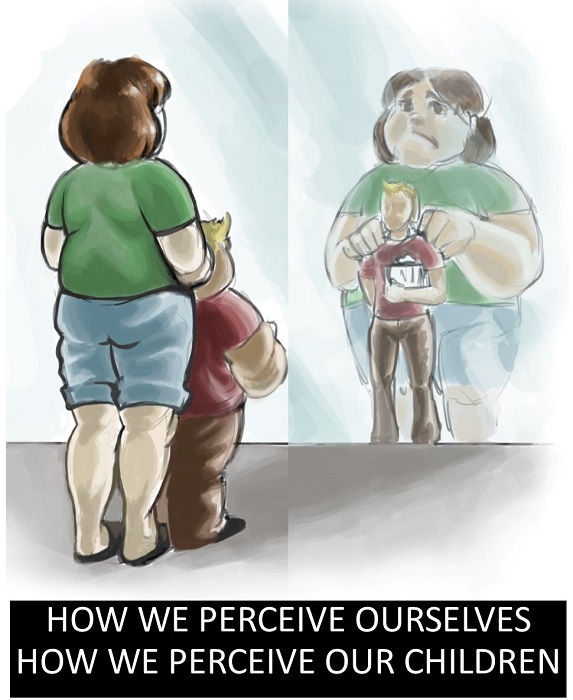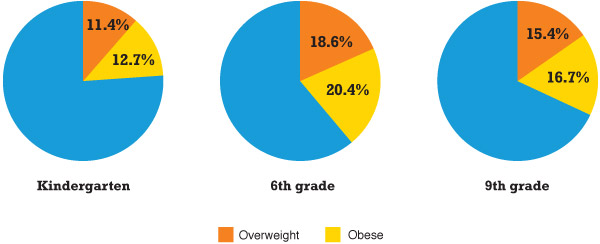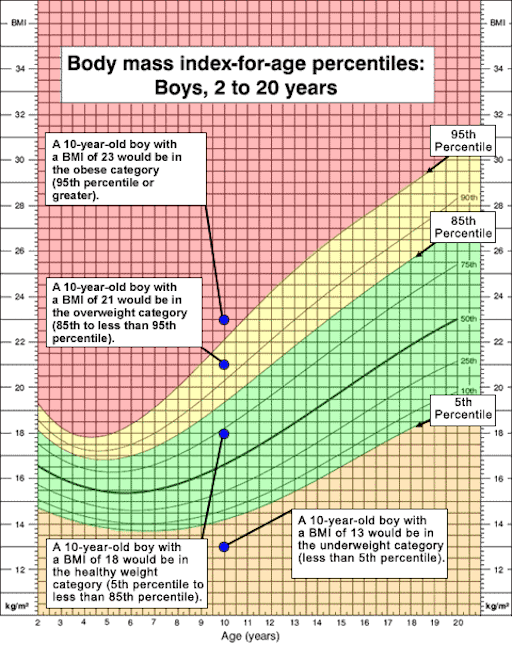 IS YOUR CHILD FAT?
IS YOUR CHILD FAT?
Here’s a question a growing segment of our PARENTAL population is going to have to begin asking themselves. The need to face REALITY is NOT based on aesthetics but rather the diseases and traumatic life altering compromises our children face if we continue to avoid this topic. The argument, “we should love our children for who they, not what they look like” does not justify the lack of parental responsibility and outright denial of the situation. I agree that a child’s character (NOT APPEARANCE) reveals the “beauty” within. This beautiful child, however, has the right to the opportunity to grow and develop into a HEALTHY, WELL FUNCTIONING ADULT.
In the past when I have lectured on this topic, I have suggested to parents they consider CLOSING THEIR EYES to better SEE and judge whether their children have weight problems. This statement has typically elicited both ANGER and CONFUSION.
.
How could they “SEE” BETTER with their eyes closed?
.
My answer to this question evoked even greater ANGER, (at first.) I said, “with your EYES OPEN, approximately 24% of your kindergartners, 39% of your elementary school children and 32% of your junior high school children have weight problems increasing their risks for lifelong diseases, dysfunction and premature DEATH.” “Closing your eyes and focusing instead on a mathematical formula determining BMI (body mass index) removes visual bias while OBJECTIVELY and HONESTLY measuring your child’s weight status and risk for developing UNNECESSARY DISEASES.”
{REFERENCE: National Health and Nutrition Examination Survey (NHANES) data (2005-2010)}

.
Parents are NEVER excited to face this TRUTH.
.
.
The only thing standing between a crowd demanding my immediate “execution” and the act being carried out was my ability to communicate my lifelong compassion and commitment to the welfare of children. I further explained the BLAME did not sit alone with them. Unhealthy school food programs (designed by the American Dietician Association), the lack of proper nutritional education in the classroom curriculum, the lack of mandatory physical education classes, the advertising and marketing of unhealthy food selections aimed directly at children on TV, the ease of access to unhealthy food choices and the quantities they’re sold in as well as the overwhelming time commitment to computers, cell phones, and other devices contributing to sedentary living all played important roles in the growth of this devastating EPIDEMIC disease.
As these parents began LISTENING and HEARING my words, their DEFENSIVE REACTIONS eased significantly. Afterall, what was my MOTIVATION and PERSONAL GAIN for inciting them? It was solely based on the quality of THEIR children’s health! It became obvious their anger was simply displaced frustration.
At this point I was able to provide them a TOOL to help clearly identify whether their children were a healthy weight, overweight or obese. They began to realize their parental biases interfered with good, honest judgement.
Although there weren’t many smiling faces as I concluded my presentation, there were many who shook my hand and offered hugs as they exited showing their appreciation and willingness to ACCEPT this serious problem.
SO, HOW DO YOU KNOW IF YOUR CHILD IS A HEALTHY WEIGHT, OVERWEIGHT OR OBESE WITHOUT BIAS?
.
Use the following SIMPLE formula and chart:
-
Measure your child’s height in inches and square it (or multiply it times itself)
-
Measure your child’s weight in pounds
-
Divide the weight by the “squared” height
-
Multiply this number by 703
-
This will produce your child’s BMI
-
Go to the chart and see where your child’s BMI is located.
EXAMPLE: 13 year old boy 5’2″ tall weighing 120 pounds
-
Child’s weight = 120 pounds
-
Child’s height (in inches) squared = 62″squared = 3844 (simply multiply the the number in inches by itself 62 inches X 62 inches = 3844)
-
Child’s weight divided by Child’s height squared 120÷ by 3844 = 0.031
-
Multiply this number just calculate by 703 (0.031 X 703 = 21.945)
-
BMI = 21.945
Go to the chart and plot your child’s age and BMI number. This will give you an OBJECTIVE HONEST METHOD to determine if your child’s weight is a factor requiring ATTENTION and ADJUSTMENTS to prevent LONG TERM health consequences.

For those using the metric system, the formula is:
-
Child’s height in meters (squared)
-
Child’s weight in kilograms
-
Divide the child’s weight in kilograms by their height in meters²
EXAMPLE 13 year old boy 1.575 meters tall weighing 54.431 kilograms
-
Weight in kilograms = 54.43
-
Height in meters² =1.575 X 1.575 = 2.480 meters
-
Divide the kilograms by the meters² 54.43 ÷ 2.480 = 21.947
-
BMI = 21.947

Childhood overweight and obesity must FIRST be identified before it can be FIXED! This guideline creates an objective method that can ultimately SAVE your child from this growing EPIDEMIC!
TAKE THE TIME AND CALCULATE YOUR CHILD’S BMI NUMBER




I am so grateful that when my children were growing up, I was a stay home mom. I made sure my children ate a good healthy breakfast, brown bagged their school lunches and had home cooked dinner ready in the evening. Still had ample time to be active in the community, volunteered in the schools, organized activities, and not to forget after school driving to girl scouts meetings, karate, ballet dancing, soccer etc etc… Making home cooked meals and keeping kids active really was optimal to their health. And no we were not rich, I just made a choice to learn to do with lot less, and not sacrifice my children well adjustment into responsible and caring
LikeLiked by 2 people
I call this description CHOOSING to be a responsible CARING parent. It’s not easy making this choice, but it is certainly the right thing to do. You should be very proud of your decision and accomplishments.
LikeLiked by 1 person
adults.
LikeLike
Sorry text cut up.
LikeLike
My kids were thin (genetics), but also very active (lifestyle choice).
LikeLiked by 1 person
I call this the best of both worlds. It still required parenting skills to reinforce habitual lifestyle choices. *Applauding* your efforts as a caring mother!
LikeLiked by 1 person
Excellent post about a difficult subject!
LikeLiked by 1 person
I’m sure you understand the subject well from your own personal experiences as a health care provider. It is a difficult subject, but one we must face with compassion as well as a greater sense of conviction.
LikeLike
Absolutely. If I ever come into a lot of money, I will start a foundation to study the art and science of behavioral change. It’s so difficult for every person.
LikeLiked by 1 person
[…] via IS YOUR CHILD FAT? — All About Healthy Choices […]
LikeLiked by 1 person
Thank you for spreading the word! It’s an issue we need to compassionately face with greater conviction.
LikeLike
Thank you for writing this and for your work on this problem.
LikeLiked by 1 person
Thank you for reading and adding your comment. Comments often consist of REAL LIFE experiences that add information to help shape future plans of action. I learn as much from my readers as I hope they learn from me. Feel free at any time to share your HONEST thoughts and feelings. I welcome all supportive AND opposing opinions as long as they are stated with constructive intentions.
Have a wonderful weekend! 🙂
LikeLike
I’m not an expert on nutrition, though my mom was a nutritionist, so I lucked out in this area as a kid. I do not have children, so this topic presents its challenges for me. All I have is my opinion, so here goes. 🙂
This really is such a difficult topic to address. There are so many conflicting messages in society. On one hand, you have the self acceptance proponents telling children they are valuable and beautiful no matter what size they are. If this becomes the primary message in their life, they learn to accept obesity. Children definitely ARE valuable, no matter their size, without question. But like this article posits, they really do deserve to live healthier lives, in fact, NEED to live healthier lives to set them up for a better quality of life for when they become adults.
There are also those who argue that the best produce (i.e. organic) is too expenive. I’ve even heard that the “cheaper” produce is just too expensive.
I wonder if the answer isn’t a restructuring of the household budget? Sacrifices MUST be made, if cost is the issue. Healthy food MUST be the top priority in a home where children reside (for everyone, really, but ESPECIALLY where children live). I believe parents really should educate themselves on how to afford healthier foods if cost is the issue.
Here is a somewhat unorthodox (but simple approach, in my opinion): If you live in a place where you don’t have the yard or property to plant a garden, then at least grow what you can in your home. There are plenty of healthier food options that can be grown right on the balcony of an apartment!
For more advice on this idea, just google: “How to grow your own vegetables in an apartment/flat/condo.” This is not my blog, so I didn’t want to provide a link. 🙂
There is a lot of information out there on the topic of growing your own produce, how to do it, and where to get the seeds. Parents can also involve their children in the growth of a small veggie garden. The personal sense of accomplishment they can achieve when the family sits down to eat what they’ve grown? Priceless. 🙂
There really are ways to achieve a healthier diet for your children. It just takes some research, some time, and some effort.
Another excellent post, Dr. Jonathan! Tough topic.
LikeLiked by 1 person
Great comment on another awesome post by Dr. Jonathan. While I agree with your comments on the costs of organic produce, I do not think it is necessary to go organic to combat childhood obesity. I also do not think it requires budget sacrifices to get their either.
It will require the parent to not “give in” to the easy path in selecting pre-made and over processed foods, allowing children to spend the bulk of their free time in front of a screen, and committing to home cooked healthy meals instead of drive thru meals.
Certainly not an easy change, but I do not believe you have to spend more to live healthy as a family.
LikeLiked by 1 person
Great points, Todd!
I completely agree that it’s not necessary to go organic.
In spite of the overwhelming data that shows otherwise, there are some people who still believe that healthy food is more expensive than junk food.
If someone truly believes that, then, in my opinion, they SHOULD make allowances in their household budgets (somewhere!) to be able to afford healthy food for their children. If that means sacrifices, then so be it. There is no argument against feeding children healthy food that cannot be addressed and fixed.
I agree that more activity at home and cooking at home are key to this issue, as well.
LikeLiked by 2 people
There is plenty of blame to spread around. Households are typically unwilling to (as you quote) “take some time, do some research and use some effort. Schools permit children to dictate the terms of food selections. Youth organizations (generally) do not make LIFESTYLE a primary focus. Religious establishments rarely (if ever) discuss the topic. And so on….
There are community garden groups that involve children in growing and preparing quality food selections. Your recommendation for home gardening would be an excellent additional option.
There are options, however, they involve effort, time and CARING! At this point, our willingness to address and correct this epidemic has been met with minimal conviction. We are still at the level of DENIAL!
I would also like to thank you and Todd for contributing to this dialogue with each other. I look forward to seeing more people discuss BOTH problems and solutions to broaden ALL OF OUR THINKING.
LikeLiked by 1 person
My children have always been thin but the first sign of weight issues was a wake up call for me so we got rid of any junk food in our home and all of us followed a better healthier lifestyle. My kid never knew why but he is now fit and does not like junk food! A great post!
LikeLiked by 2 people
You are certainly ahead of your time. Congratulations on your ACTIVE participation.
LikeLiked by 1 person
Thanks
LikeLike
A very good and important read. I know there has been some controversy on applying BMI with some adults, specifically body builders, but it would seem to me to be a universally good tool to assess children.
To your point, it can hard to be objective with your own kids. I know it is with mine. Very hard to argue with a BMI number though.
Another semi rant here – “healthy” school lunches are a joke. I am consistently horrified what they serve to kids on a daily basis at the school our children attend. Thankfully, most of the kids are packing their lunch so we do not meet much resistance from our children with sending lunch with them.
Thanks for posting!
LikeLiked by 2 people
Your “rant” is one many parents participate in (legitimately.) Children spend approximately 29% of their time during the week in school. If these LEARNING establishments are incapable of providing EDUCATION about ESSENTIAL LIFESTYLE patterns of behavior, the school day should be shortened. Naturally, federal and state school funding would have to be redistributed to after school programs where these ESSENTIAL needs could be taught. Maybe this would incentivize a curriculum review increasing the school’s responsibility and participation in improving healthier outcomes for our children.
LikeLiked by 1 person
I also wonder if this BMI calculator is being used in schools? It’s my first time seeing it, so forgive my naivete! I never saw a BMI calculator until I joined a fitness club as young adult, and again, since I don’t have children, then I have no way of knowing if this is in the schools.
If this information was distributed to all elementary, middle, junior high, and high schools for health classes, p.e. classes, etc. then that would create more accountability in this area. Kind of like a report card for the body.
LikeLiked by 1 person
At least your suggestion would create additional awareness. Sometimes this is a necessary starting point.
LikeLiked by 1 person
Excellent post Jonathan !!!!
At the end of the day, I believe it is all about choice. I feel the parents need to take responsibility and take charge in this area, and do the best they can do. Parents can’t turn a blind eye to this and if they do, they are not helping their child.
I really can go on and on about this subject, which I really feel extremely strongly about !
LikeLiked by 1 person
It’s a very tough and emotional issue, however, it is important that it be addressed compassionately, respectfully and immediately. No one likes to be confronted with this problem. Ignoring it, however, will never solve it. This post gives EVERY parent a chance to at least IDENTIFY OBJECTIVELY if their child has a weight issue putting them at greater risk for disease and dysfunction. This does NOT mean a parent identifying this problem is a “bad parent.” It means they were unlikely AWARE and NOW have a chance to improve their child’s health. Any parent not knowing how or where to start is welcomed to contact me. I do NOT CHARGE ANYTHING to assist people. All I ask is they consider “paying if forward” by offering help to others in need.
LikeLiked by 1 person
It may be a difficult thing to talk about because as a parent you could be causing this or at least enabling it to happen. I really like the fact that you’re saying we need to have this conversation sooner than later because it is a child’s right. I had this conversation with my parents when I was little and I truly believe it is the reason I am alive today.
LikeLiked by 1 person
There are 3 types of responses to a post like this.
1. Resentment- this comes from a false belief that I am telling parents how to raise their children.
2. Denial- my child will “grow” into a healthy weight
3. Appreciation- a recognition that the purpose of this post is to ASSIST (not blame) parents for their children’s weight management issues.
Thank you for adding your opinion and for adding a voice to this important issue.
LikeLike